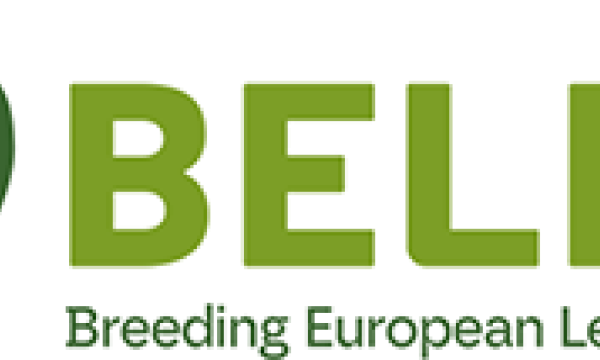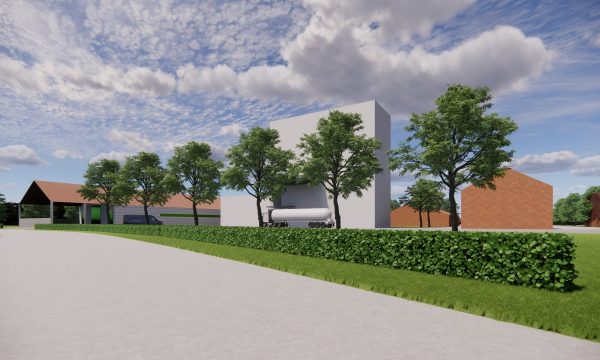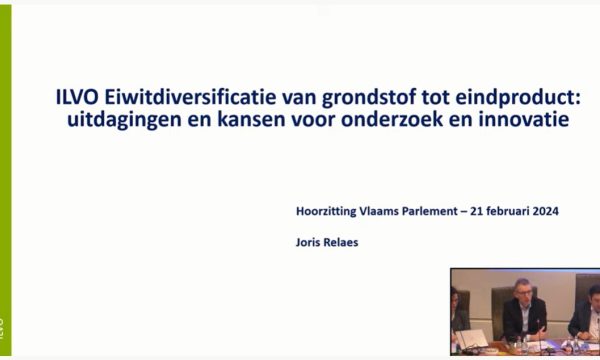Press release Foundation stone of the 'Feed Pilot' a new research infrastructure for precision animal nutrition at ILVO, laid in June 2025

The crucial puzzle piece for testing new raw materials and processing in FEED production
Flemish minister-president Matthias Diependaele laid the symbolic foundation stone on June 3, 2025 for new research infrastructure for precision animal feed at ILVO, called the FEED PILOT.
That test hall can be used to make experimental feeds for all kinds of farm animals. For Flanders, Belgium and surrounding countries, it is a unique building, not only because of the technological equipment and sensors, or because of the fact that very precisely composed and documented feeds with all kinds of new raw materials, components and processing are made here. The integration into the ILVO knowledge environment on animal husbandry, feed technology, nutrition and sustainability, as well as the commitment of the feed-related companies, make the FEED PILOT concept special.
The laying of this symbolic foundation stone was in reality the placement of the very first silo element.



Flanders enthusiastic about plans to collaborate on the FEED PILOT
"With this investment in the FEED PILOT, Flanders is strengthening its position in strategic sectors such as agri-food. We are building an advanced research facility that links scientific excellence to economic added value. With our strong know-how in such a unique research environment, we are giving our companies an important edge in innovation," believes Flemish Minister-President Matthias Diependaele. "By anchoring animal feed production locally, we ensure our own food production and are less vulnerable to the vagaries of the international market. Projects like these therefore boost our circular economy. Residual streams are better utilized. This all helps to shape the feed production of tomorrow."
Several companies active in animal feed, supplements and specialized processing equipment have said they are counting on intensive knowledge sharing, joint or individual research projects and training opportunities for their staff.
Sam De Campeneere, Scientific Director of ILVO's Livestock Husbandry division: "We are marketing the FEED PILOT as a bridge between science and economic practice. Together with feed companies, premix producers, feed technology suppliers, food & other actors with by-products and together with other research institutions, we want to accelerate innovations, optimize processes and provide answers to societal challenges such as climate change, circular economy and protein transition."
The Feed Pilot will cost approximately €6 million. More than half of that comes from the Flemish government. ERDF and ILVO's Own Capital fund pay the rest. And there is also valued additional support from the Province of East Flanders and from the Victam Foundation, a globally active foundation that promotes technology research in the animal feed sector.
Innovation in (agricultural) animal feed has multiple drivers
Livestock farming and animal feed are being challenged socially on multiple flanks. Pressure due to stricter requirements regarding emission reduction (nitrogen, methane), animal welfare requirements, the desired protein transition, food autonomy, more circularity, high competitive quality, safety and also profitability are all being felt. Among the possible solutions are better nutritional strategies.

Methane
A 19% reduction enteric emissions (methane from the cow's rumen) in Flanders by 2030 as compared to 2005. That is the promise of 15 Flemish organizations (research institutions, government, agricultural organizations, feed manufacturers...) in the Covenant for Cattle Enteric Emissions 2019-2030. The solutions are mainly sought in (feed) strategies, to ensure profitable production of animal products with a reduced environmental impact.
Nitrogen
Nitrogen may not exceed critical threshold values in Natura 2000 areas by 2050. The PAS (Programmatic Approach to Nitrogen) measures for those stringent reductions in ammonia emissions rely in part on nutritional interventions: e.g. lower crude protein content, phase feeding (in poultry) and more precisely adjusted amino acid contents according to animal needs.
Animal welfare
Some animal welfare topics have a link to feed. For example, prevention of stomach ulcers or metabolic disorders. Not only the composition, but also the processing of the feed has an influence. The ILVO Feed Pilot supports this research.
Circular valorization of residual streams
More high-value use of residual streams (in feed, for example) and closing loops are goals included in the Flemish Bio-Economy Policy Plan and in Flanders Circular. Companies and research institutes need opportunities for trials and tests to incorporate new products in feed - in other words, a FEED PILOT.
Too little European-sourced protein (amino acids)
Europe is historically short of certain protein sources and of specific essential protein building blocks (amino acids). Imports come from the USA, Latin America and, until recently, China. In recent years, new sources of protein have been deployed: smarter use of protein residual streams (e.g. whey powder, etc.), new animal sources (e.g. insects) or cellular proteins (microbial protein, algae, fermentation products, etc.), and locally grown soy. Within its protein transition plan, Flanders also points to the role of animal proteins (dairy, eggs and meat), which are preferably produced as sustainably as possible. Livestock feed has an impact on this sustainability objective.
New raw materials, supplements, additives
The ability to produce trial feeds in a controlled and highly precise manner, both in large and small batches (e.g. only 100 kg) is essential for reliable nutritional research in farm animals. Finding the ideal (minute) dose of innovative additives (e.g. methane inhibitors) or smaller protein enrichments with e.g. algae, microbial protein powders or residues from the food industry relies on precision in the feed experiments. Test feeds will be produced for ILVO's own research projects and for external parties developing solutions to livestock farming challenges.
Precision processing
Feed quality relies for 60% on the (proportion and choice of) raw materials, and 40% on the processing method. Katrien D'hooghe, director BFA and director of the Victam Foundation: "From the animal feed, premix and additives sector, there is a need for a Belgian pilot installation to carry out thorough, small-scale technological tests and to promote knowledge sharing through training. Our question is always which parameters/choices in the production process lead to which improvements in the final feed, for example in terms of quality or sustainability. Our own production lines are often less suitable for such tests due to scale and food safety conditions."
Energy efficiency
The production of cattle feed requires a lot of energy and is a major factor in the cost of the final product. The FEED PILOT will be equipped with sensors for each machine to determine the energy efficiency of the entire processing process. "We can measure various parameters continuously during the operation of the devices. Adjustments are thus evaluated in terms of final product quality as well as sustainability and energy impact," says Annatachja De Grande, Feed Pilot project manager. "The monitoring data from the FEED PILOT can be transposed to the energy consumption of the companies. The Flemish Government stimulates companies towards more energy efficiency, e.g. with a mandatory energy plan as of a certain energy consumption."
Conclusion
Feed Pilot will be a research platform from which social and economic added value is created in the broad agri-food sector. The independent character of ILVO guarantees objectivity and, where required, confidentiality in its advice and cooperation. The smaller and larger central production lines in combination with the extensive set of silos offers new flexible possibilities to make trial feeds with high precision, in a variety of batch sizes.
Joris Relaes, ILVO Administrator-General: "Meat consumption is stagnating in Western Europe, but worldwide it is rising. The European Commission still expects meat consumption to grow by 41 million tons. That figure is equivalent to total European meat production today. It therefore remains our duty to provide maximum assistance to all those operating in that sector to become more sustainable."


